Academic Skills Portfolio (ACSK4001): Autumn 2017 - Student Submission
VerifiedAdded on 2020/04/13
|38
|6365
|124
Portfolio
AI Summary
This portfolio, submitted for the ACSK4001 Academic Skills course in Autumn 2017, documents a student's journey in developing key academic competencies. It includes a self-evaluation checklist, a personal SWOT analysis, exercises on structuring writing, quantitative data analysis, evaluating sources and referencing, synthesizing information, and presenting assignments. The portfolio also features reflective writing, a personal development plan, and a degree-specific focus on the impact of Brexit on recruitment and retention. The student demonstrates an understanding of academic literacy, critical thinking, and the use of technology to facilitate self-analysis and reflection. The work includes in-class activities, written tasks, and reflections on strengths, weaknesses, and opportunities for academic and personal growth. The portfolio provides detailed plans and analyses, including a data analysis based on a provided graph, and evaluates various resources. The student's work highlights their ability to apply theoretical concepts to real-world scenarios, demonstrating a comprehensive grasp of academic skills. This is a student submission published on Desklib, a platform offering AI-based study tools.
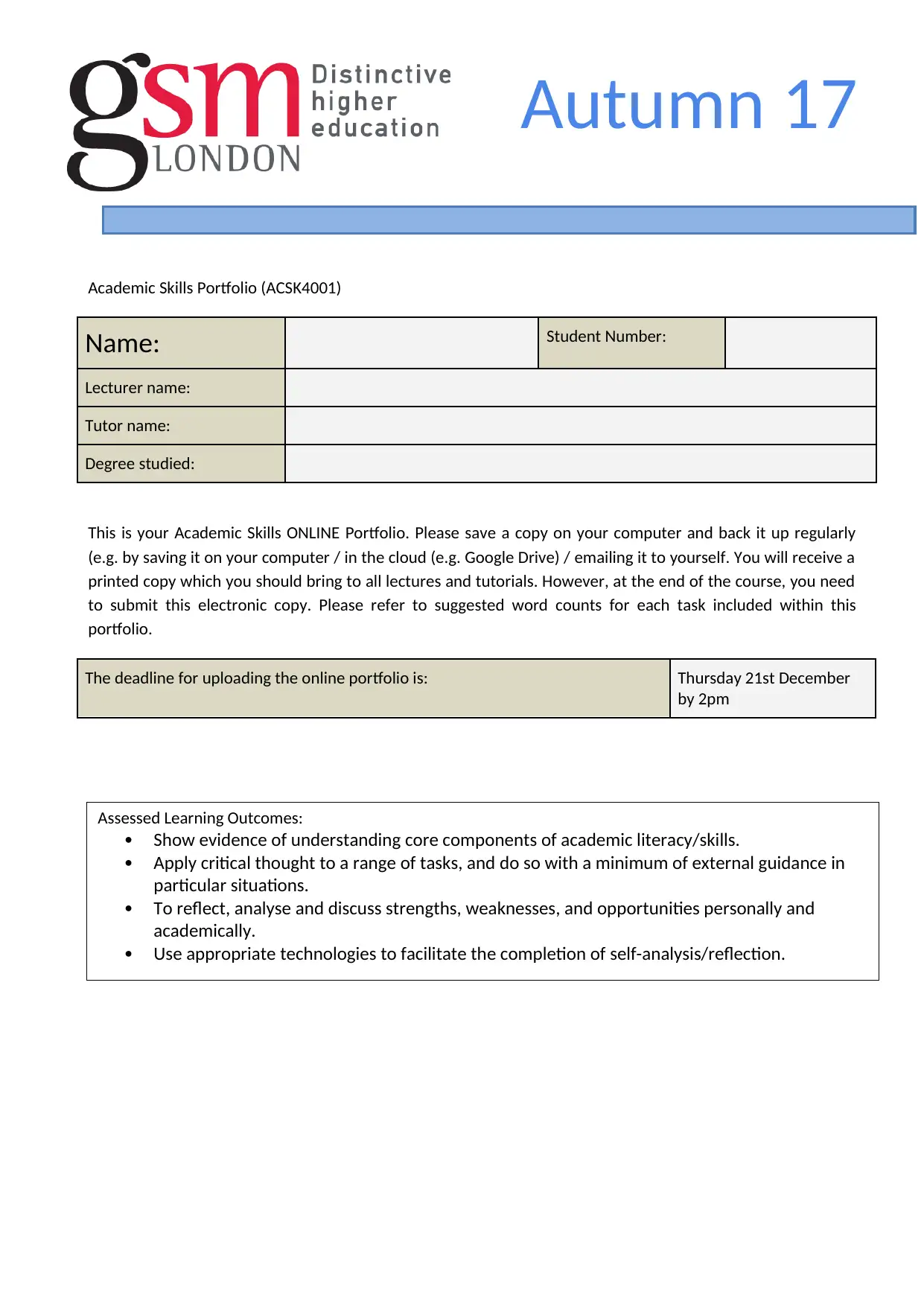
Autumn 17
Academic Skills Portfolio (ACSK4001)
Name: Student Number:
Lecturer name:
Tutor name:
Degree studied:
This is your Academic Skills ONLINE Portfolio. Please save a copy on your computer and back it up regularly
(e.g. by saving it on your computer / in the cloud (e.g. Google Drive) / emailing it to yourself. You will receive a
printed copy which you should bring to all lectures and tutorials. However, at the end of the course, you need
to submit this electronic copy. Please refer to suggested word counts for each task included within this
portfolio.
The deadline for uploading the online portfolio is: Thursday 21st December
by 2pm
Assessed Learning Outcomes:
Show evidence of understanding core components of academic literacy/skills.
Apply critical thought to a range of tasks, and do so with a minimum of external guidance in
particular situations.
To reflect, analyse and discuss strengths, weaknesses, and opportunities personally and
academically.
Use appropriate technologies to facilitate the completion of self-analysis/reflection.
Academic Skills Portfolio (ACSK4001)
Name: Student Number:
Lecturer name:
Tutor name:
Degree studied:
This is your Academic Skills ONLINE Portfolio. Please save a copy on your computer and back it up regularly
(e.g. by saving it on your computer / in the cloud (e.g. Google Drive) / emailing it to yourself. You will receive a
printed copy which you should bring to all lectures and tutorials. However, at the end of the course, you need
to submit this electronic copy. Please refer to suggested word counts for each task included within this
portfolio.
The deadline for uploading the online portfolio is: Thursday 21st December
by 2pm
Assessed Learning Outcomes:
Show evidence of understanding core components of academic literacy/skills.
Apply critical thought to a range of tasks, and do so with a minimum of external guidance in
particular situations.
To reflect, analyse and discuss strengths, weaknesses, and opportunities personally and
academically.
Use appropriate technologies to facilitate the completion of self-analysis/reflection.
Paraphrase This Document
Need a fresh take? Get an instant paraphrase of this document with our AI Paraphraser
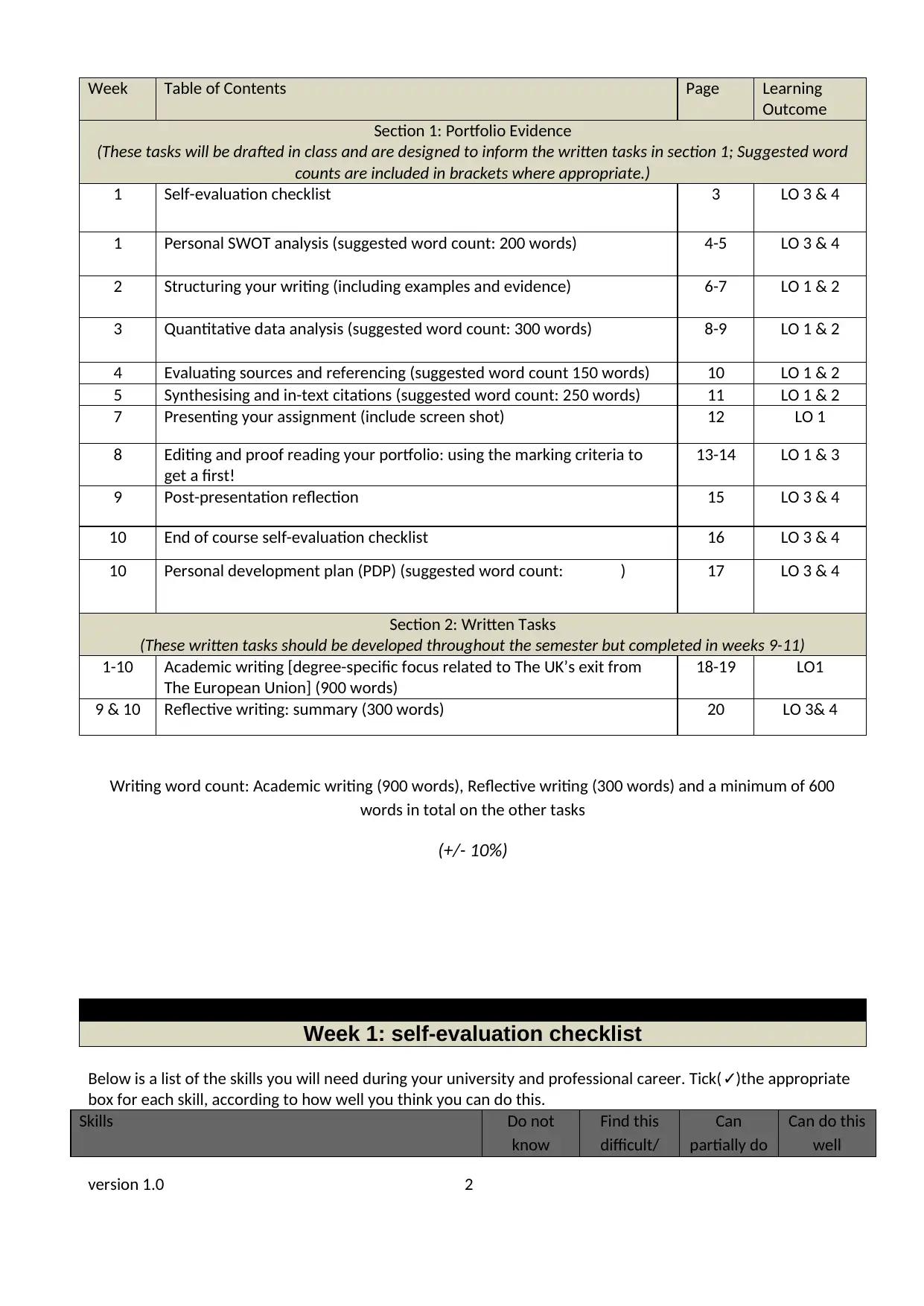
Week Table of Contents Page Learning
Outcome
Section 1: Portfolio Evidence
(These tasks will be drafted in class and are designed to inform the written tasks in section 1; Suggested word
counts are included in brackets where appropriate.)
1 Self-evaluation checklist 3 LO 3 & 4
1 Personal SWOT analysis (suggested word count: 200 words) 4-5 LO 3 & 4
2 Structuring your writing (including examples and evidence) 6-7 LO 1 & 2
3 Quantitative data analysis (suggested word count: 300 words) 8-9 LO 1 & 2
4 Evaluating sources and referencing (suggested word count 150 words) 10 LO 1 & 2
5 Synthesising and in-text citations (suggested word count: 250 words) 11 LO 1 & 2
7 Presenting your assignment (include screen shot) 12 LO 1
8 Editing and proof reading your portfolio: using the marking criteria to
get a first!
13-14 LO 1 & 3
9 Post-presentation reflection 15 LO 3 & 4
10 End of course self-evaluation checklist 16 LO 3 & 4
10 Personal development plan (PDP) (suggested word count: ) 17 LO 3 & 4
Section 2: Written Tasks
(These written tasks should be developed throughout the semester but completed in weeks 9-11)
1-10 Academic writing [degree-specific focus related to The UK’s exit from
The European Union] (900 words)
18-19 LO1
9 & 10 Reflective writing: summary (300 words) 20 LO 3& 4
Writing word count: Academic writing (900 words), Reflective writing (300 words) and a minimum of 600
words in total on the other tasks
(+/- 10%)
SECTION 1: PORTFOLIO EVIDENCE
Week 1: self-evaluation checklist
Below is a list of the skills you will need during your university and professional career. Tick( )the appropriate✓
box for each skill, according to how well you think you can do this.
Skills Do not
know
Find this
difficult/
Can
partially do
Can do this
well
version 1.0 2
Outcome
Section 1: Portfolio Evidence
(These tasks will be drafted in class and are designed to inform the written tasks in section 1; Suggested word
counts are included in brackets where appropriate.)
1 Self-evaluation checklist 3 LO 3 & 4
1 Personal SWOT analysis (suggested word count: 200 words) 4-5 LO 3 & 4
2 Structuring your writing (including examples and evidence) 6-7 LO 1 & 2
3 Quantitative data analysis (suggested word count: 300 words) 8-9 LO 1 & 2
4 Evaluating sources and referencing (suggested word count 150 words) 10 LO 1 & 2
5 Synthesising and in-text citations (suggested word count: 250 words) 11 LO 1 & 2
7 Presenting your assignment (include screen shot) 12 LO 1
8 Editing and proof reading your portfolio: using the marking criteria to
get a first!
13-14 LO 1 & 3
9 Post-presentation reflection 15 LO 3 & 4
10 End of course self-evaluation checklist 16 LO 3 & 4
10 Personal development plan (PDP) (suggested word count: ) 17 LO 3 & 4
Section 2: Written Tasks
(These written tasks should be developed throughout the semester but completed in weeks 9-11)
1-10 Academic writing [degree-specific focus related to The UK’s exit from
The European Union] (900 words)
18-19 LO1
9 & 10 Reflective writing: summary (300 words) 20 LO 3& 4
Writing word count: Academic writing (900 words), Reflective writing (300 words) and a minimum of 600
words in total on the other tasks
(+/- 10%)
SECTION 1: PORTFOLIO EVIDENCE
Week 1: self-evaluation checklist
Below is a list of the skills you will need during your university and professional career. Tick( )the appropriate✓
box for each skill, according to how well you think you can do this.
Skills Do not
know
Find this
difficult/
Can
partially do
Can do this
well
version 1.0 2
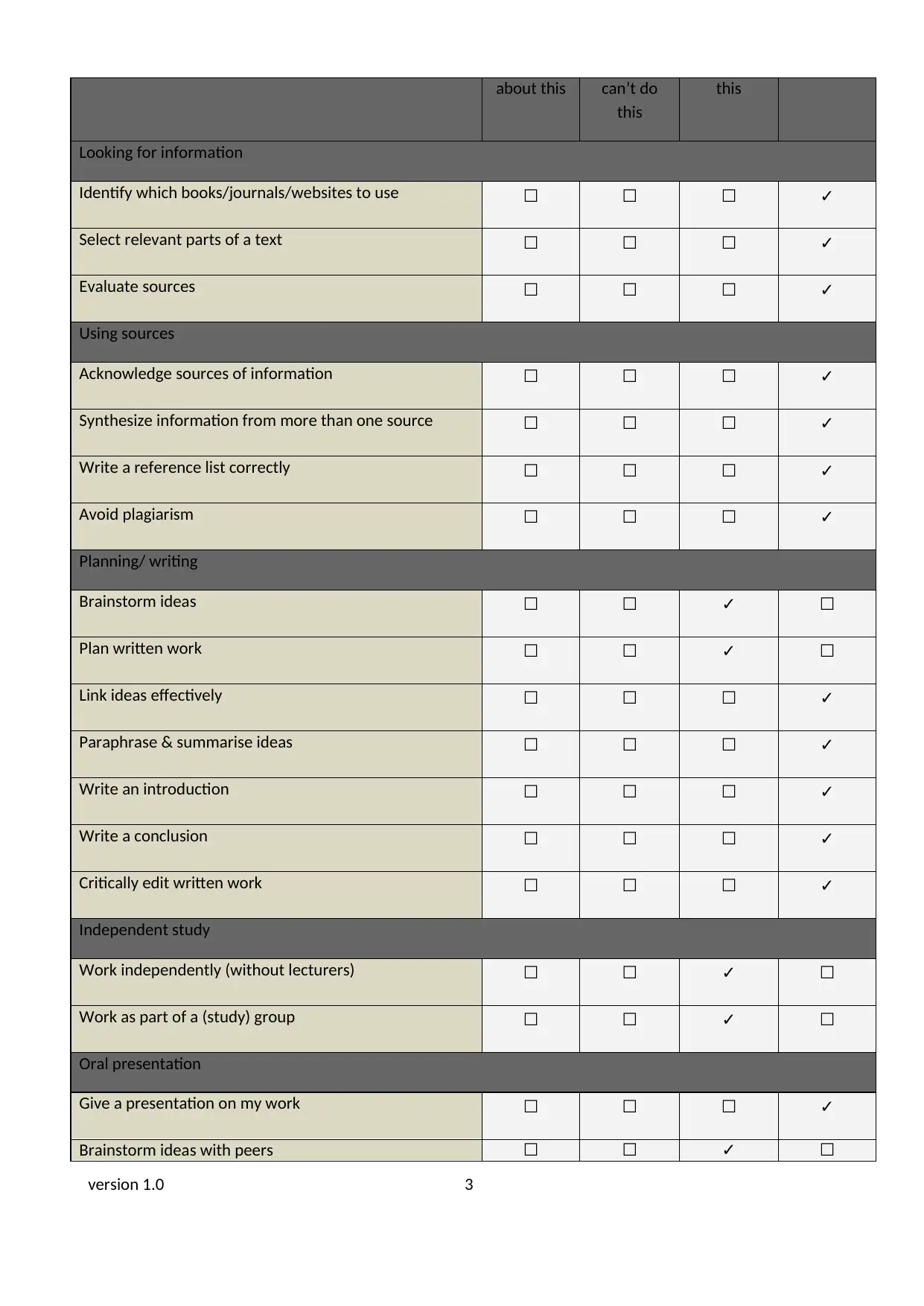
about this can’t do
this
this
Looking for information
Identify which books/journals/websites to use ☐ ☐ ☐ ✓
Select relevant parts of a text ☐ ☐ ☐ ✓
Evaluate sources ☐ ☐ ☐ ✓
Using sources
Acknowledge sources of information ☐ ☐ ☐ ✓
Synthesize information from more than one source ☐ ☐ ☐ ✓
Write a reference list correctly ☐ ☐ ☐ ✓
Avoid plagiarism ☐ ☐ ☐ ✓
Planning/ writing
Brainstorm ideas ☐ ☐ ✓ ☐
Plan written work ☐ ☐ ✓ ☐
Link ideas effectively ☐ ☐ ☐ ✓
Paraphrase & summarise ideas ☐ ☐ ☐ ✓
Write an introduction ☐ ☐ ☐ ✓
Write a conclusion ☐ ☐ ☐ ✓
Critically edit written work ☐ ☐ ☐ ✓
Independent study
Work independently (without lecturers) ☐ ☐ ✓ ☐
Work as part of a (study) group ☐ ☐ ✓ ☐
Oral presentation
Give a presentation on my work ☐ ☐ ☐ ✓
Brainstorm ideas with peers ☐ ☐ ✓ ☐
version 1.0 3
this
this
Looking for information
Identify which books/journals/websites to use ☐ ☐ ☐ ✓
Select relevant parts of a text ☐ ☐ ☐ ✓
Evaluate sources ☐ ☐ ☐ ✓
Using sources
Acknowledge sources of information ☐ ☐ ☐ ✓
Synthesize information from more than one source ☐ ☐ ☐ ✓
Write a reference list correctly ☐ ☐ ☐ ✓
Avoid plagiarism ☐ ☐ ☐ ✓
Planning/ writing
Brainstorm ideas ☐ ☐ ✓ ☐
Plan written work ☐ ☐ ✓ ☐
Link ideas effectively ☐ ☐ ☐ ✓
Paraphrase & summarise ideas ☐ ☐ ☐ ✓
Write an introduction ☐ ☐ ☐ ✓
Write a conclusion ☐ ☐ ☐ ✓
Critically edit written work ☐ ☐ ☐ ✓
Independent study
Work independently (without lecturers) ☐ ☐ ✓ ☐
Work as part of a (study) group ☐ ☐ ✓ ☐
Oral presentation
Give a presentation on my work ☐ ☐ ☐ ✓
Brainstorm ideas with peers ☐ ☐ ✓ ☐
version 1.0 3
⊘ This is a preview!⊘
Do you want full access?
Subscribe today to unlock all pages.

Trusted by 1+ million students worldwide
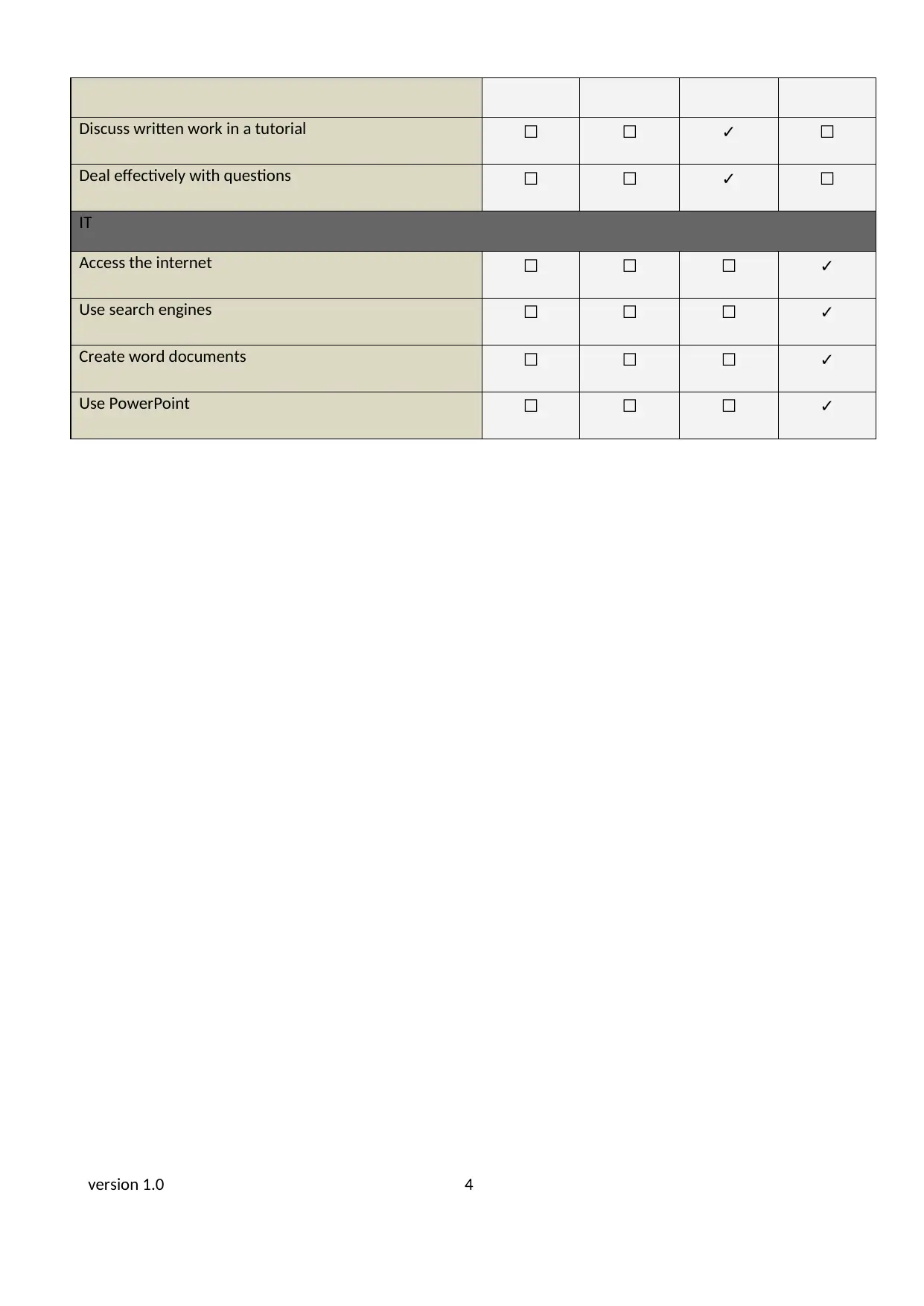
Discuss written work in a tutorial ☐ ☐ ✓ ☐
Deal effectively with questions ☐ ☐ ✓ ☐
IT
Access the internet ☐ ☐ ☐ ✓
Use search engines ☐ ☐ ☐ ✓
Create word documents ☐ ☐ ☐ ✓
Use PowerPoint ☐ ☐ ☐ ✓
version 1.0 4
Deal effectively with questions ☐ ☐ ✓ ☐
IT
Access the internet ☐ ☐ ☐ ✓
Use search engines ☐ ☐ ☐ ✓
Create word documents ☐ ☐ ☐ ✓
Use PowerPoint ☐ ☐ ☐ ✓
version 1.0 4
Paraphrase This Document
Need a fresh take? Get an instant paraphrase of this document with our AI Paraphraser
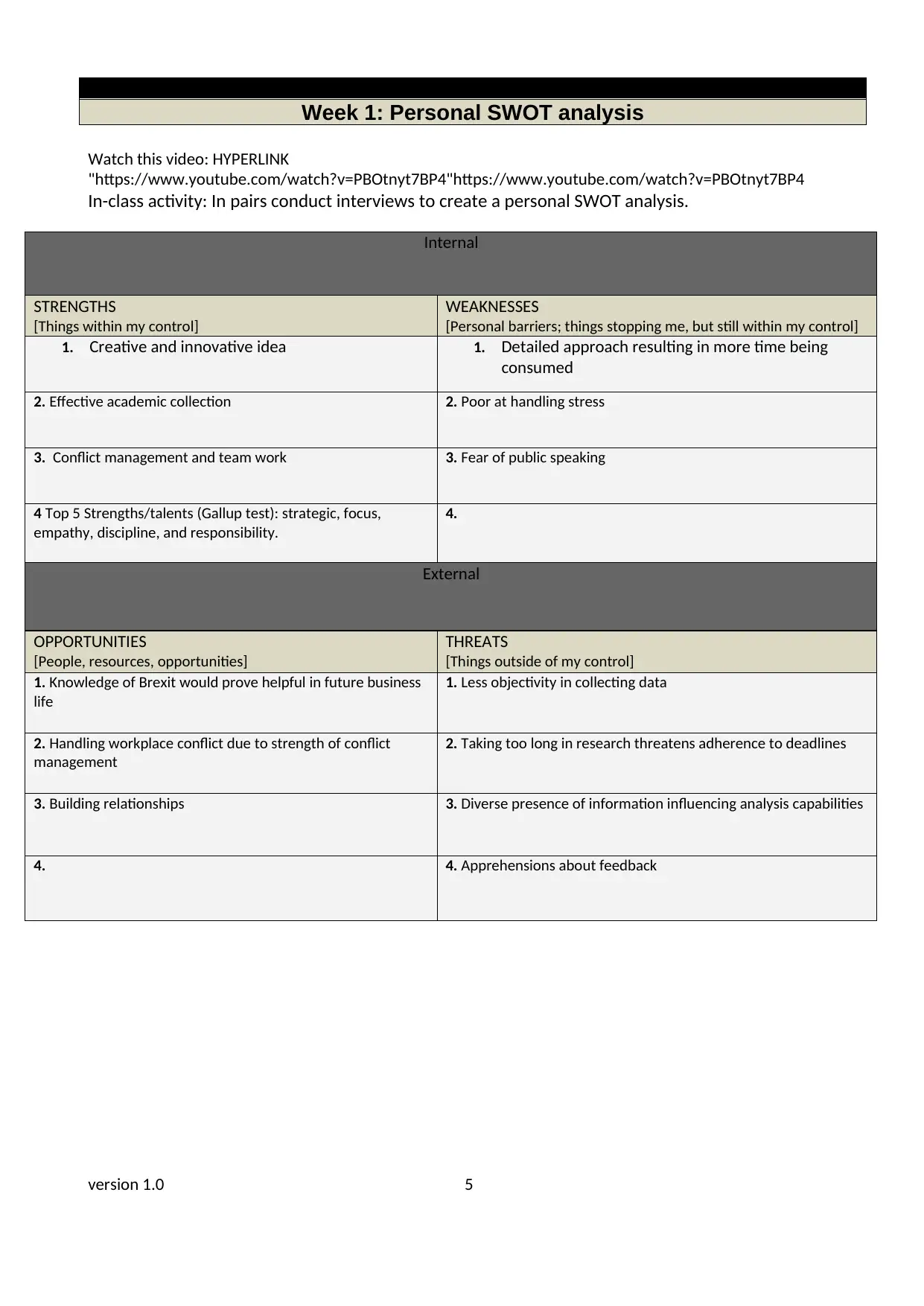
SECTION 1: PORTFOLIO EVIDENCE
Week 1: Personal SWOT analysis
Watch this video: HYPERLINK
"https://www.youtube.com/watch?v=PBOtnyt7BP4"https://www.youtube.com/watch?v=PBOtnyt7BP4
In-class activity: In pairs conduct interviews to create a personal SWOT analysis.
Internal
STRENGTHS
[Things within my control]
WEAKNESSES
[Personal barriers; things stopping me, but still within my control]
1. Creative and innovative idea 1. Detailed approach resulting in more time being
consumed
2. Effective academic collection 2. Poor at handling stress
3. Conflict management and team work 3. Fear of public speaking
4 Top 5 Strengths/talents (Gallup test): strategic, focus,
empathy, discipline, and responsibility.
4.
External
OPPORTUNITIES
[People, resources, opportunities]
THREATS
[Things outside of my control]
1. Knowledge of Brexit would prove helpful in future business
life
1. Less objectivity in collecting data
2. Handling workplace conflict due to strength of conflict
management
2. Taking too long in research threatens adherence to deadlines
3. Building relationships 3. Diverse presence of information influencing analysis capabilities
4. 4. Apprehensions about feedback
version 1.0 5
Week 1: Personal SWOT analysis
Watch this video: HYPERLINK
"https://www.youtube.com/watch?v=PBOtnyt7BP4"https://www.youtube.com/watch?v=PBOtnyt7BP4
In-class activity: In pairs conduct interviews to create a personal SWOT analysis.
Internal
STRENGTHS
[Things within my control]
WEAKNESSES
[Personal barriers; things stopping me, but still within my control]
1. Creative and innovative idea 1. Detailed approach resulting in more time being
consumed
2. Effective academic collection 2. Poor at handling stress
3. Conflict management and team work 3. Fear of public speaking
4 Top 5 Strengths/talents (Gallup test): strategic, focus,
empathy, discipline, and responsibility.
4.
External
OPPORTUNITIES
[People, resources, opportunities]
THREATS
[Things outside of my control]
1. Knowledge of Brexit would prove helpful in future business
life
1. Less objectivity in collecting data
2. Handling workplace conflict due to strength of conflict
management
2. Taking too long in research threatens adherence to deadlines
3. Building relationships 3. Diverse presence of information influencing analysis capabilities
4. 4. Apprehensions about feedback
version 1.0 5
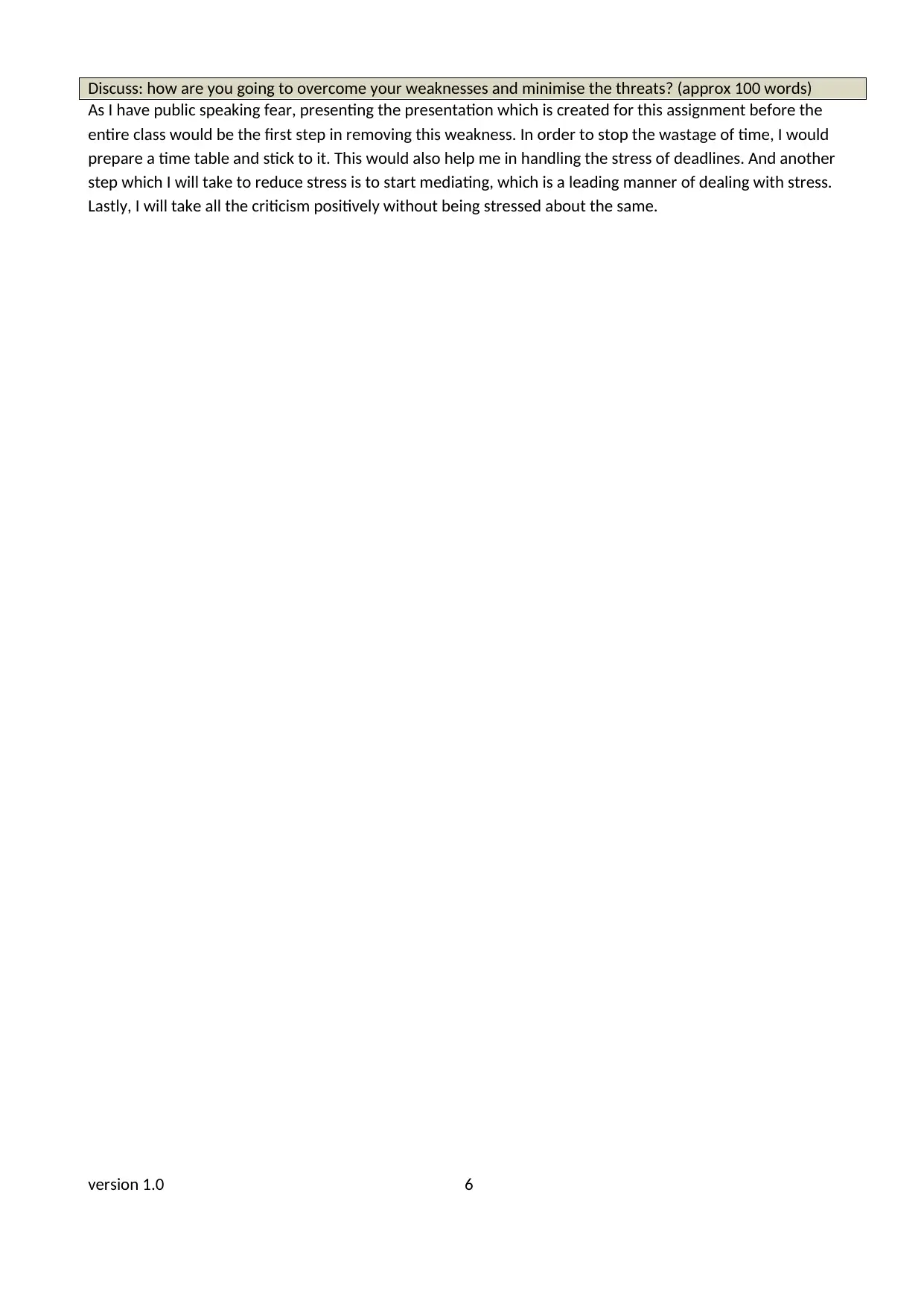
Discuss: how are you going to overcome your weaknesses and minimise the threats? (approx 100 words)
As I have public speaking fear, presenting the presentation which is created for this assignment before the
entire class would be the first step in removing this weakness. In order to stop the wastage of time, I would
prepare a time table and stick to it. This would also help me in handling the stress of deadlines. And another
step which I will take to reduce stress is to start mediating, which is a leading manner of dealing with stress.
Lastly, I will take all the criticism positively without being stressed about the same.
version 1.0 6
As I have public speaking fear, presenting the presentation which is created for this assignment before the
entire class would be the first step in removing this weakness. In order to stop the wastage of time, I would
prepare a time table and stick to it. This would also help me in handling the stress of deadlines. And another
step which I will take to reduce stress is to start mediating, which is a leading manner of dealing with stress.
Lastly, I will take all the criticism positively without being stressed about the same.
version 1.0 6
⊘ This is a preview!⊘
Do you want full access?
Subscribe today to unlock all pages.

Trusted by 1+ million students worldwide
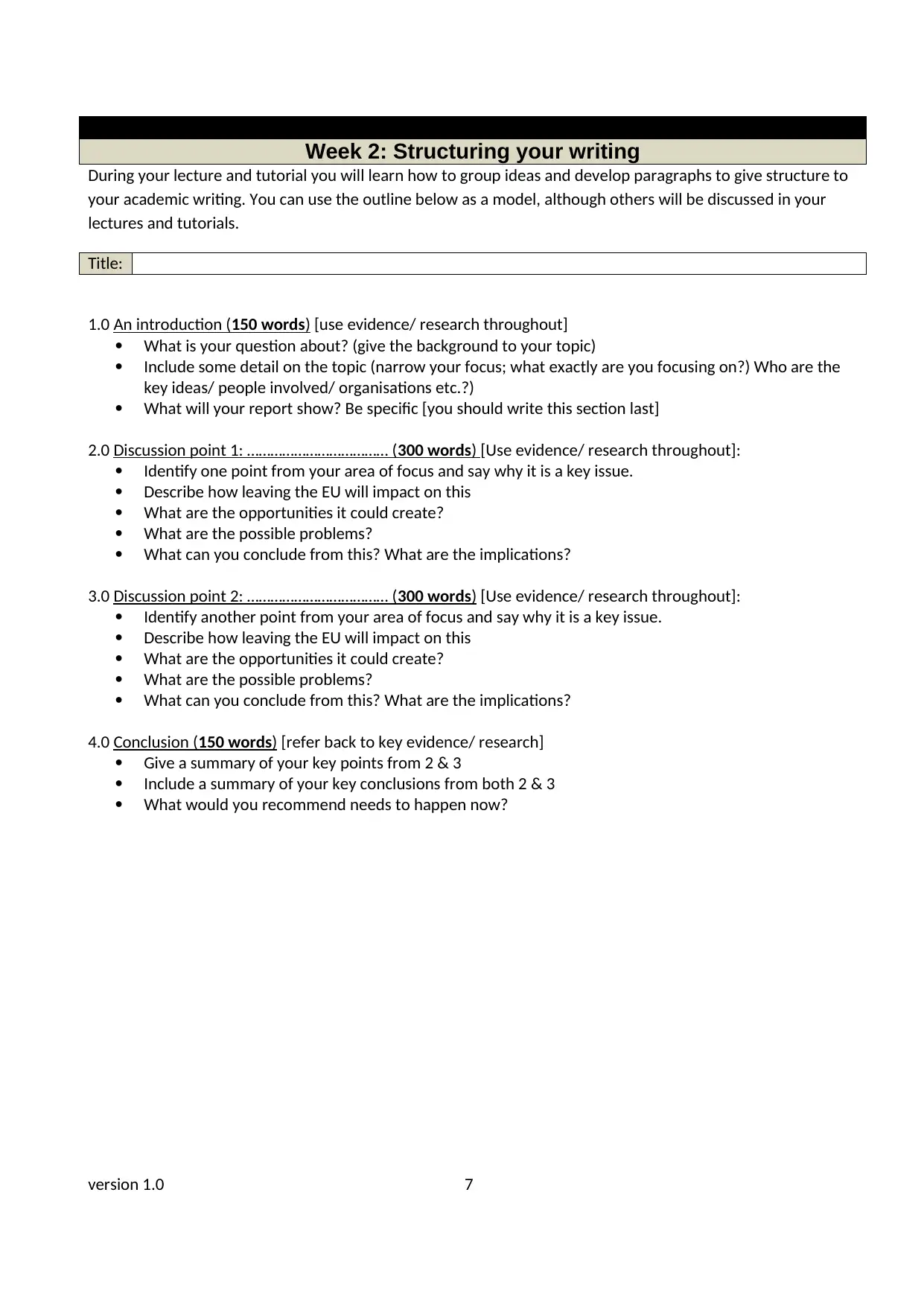
SECTION 1: PORTFOLIO EVIDENCE
Week 2: Structuring your writing
During your lecture and tutorial you will learn how to group ideas and develop paragraphs to give structure to
your academic writing. You can use the outline below as a model, although others will be discussed in your
lectures and tutorials.
Title:
1.0 An introduction (150 words) [use evidence/ research throughout]
What is your question about? (give the background to your topic)
Include some detail on the topic (narrow your focus; what exactly are you focusing on?) Who are the
key ideas/ people involved/ organisations etc.?)
What will your report show? Be specific [you should write this section last]
2.0 Discussion point 1: ……………………………… (300 words) [Use evidence/ research throughout]:
Identify one point from your area of focus and say why it is a key issue.
Describe how leaving the EU will impact on this
What are the opportunities it could create?
What are the possible problems?
What can you conclude from this? What are the implications?
3.0 Discussion point 2: ……………………………… (300 words) [Use evidence/ research throughout]:
Identify another point from your area of focus and say why it is a key issue.
Describe how leaving the EU will impact on this
What are the opportunities it could create?
What are the possible problems?
What can you conclude from this? What are the implications?
4.0 Conclusion (150 words) [refer back to key evidence/ research]
Give a summary of your key points from 2 & 3
Include a summary of your key conclusions from both 2 & 3
What would you recommend needs to happen now?
version 1.0 7
Week 2: Structuring your writing
During your lecture and tutorial you will learn how to group ideas and develop paragraphs to give structure to
your academic writing. You can use the outline below as a model, although others will be discussed in your
lectures and tutorials.
Title:
1.0 An introduction (150 words) [use evidence/ research throughout]
What is your question about? (give the background to your topic)
Include some detail on the topic (narrow your focus; what exactly are you focusing on?) Who are the
key ideas/ people involved/ organisations etc.?)
What will your report show? Be specific [you should write this section last]
2.0 Discussion point 1: ……………………………… (300 words) [Use evidence/ research throughout]:
Identify one point from your area of focus and say why it is a key issue.
Describe how leaving the EU will impact on this
What are the opportunities it could create?
What are the possible problems?
What can you conclude from this? What are the implications?
3.0 Discussion point 2: ……………………………… (300 words) [Use evidence/ research throughout]:
Identify another point from your area of focus and say why it is a key issue.
Describe how leaving the EU will impact on this
What are the opportunities it could create?
What are the possible problems?
What can you conclude from this? What are the implications?
4.0 Conclusion (150 words) [refer back to key evidence/ research]
Give a summary of your key points from 2 & 3
Include a summary of your key conclusions from both 2 & 3
What would you recommend needs to happen now?
version 1.0 7
Paraphrase This Document
Need a fresh take? Get an instant paraphrase of this document with our AI Paraphraser
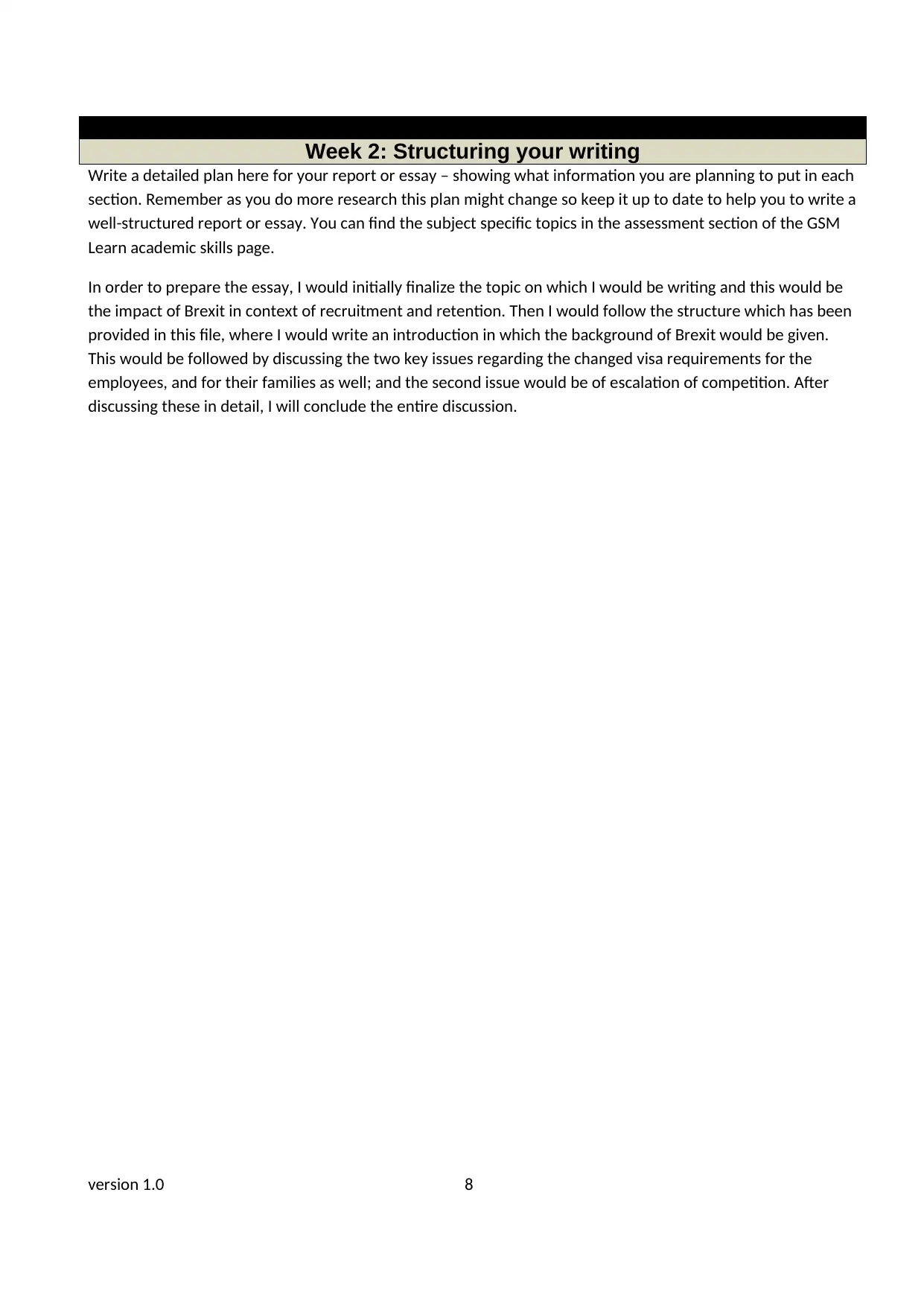
SECTION 1: PORTFOLIO EVIDENCE
Week 2: Structuring your writing
Write a detailed plan here for your report or essay – showing what information you are planning to put in each
section. Remember as you do more research this plan might change so keep it up to date to help you to write a
well-structured report or essay. You can find the subject specific topics in the assessment section of the GSM
Learn academic skills page.
In order to prepare the essay, I would initially finalize the topic on which I would be writing and this would be
the impact of Brexit in context of recruitment and retention. Then I would follow the structure which has been
provided in this file, where I would write an introduction in which the background of Brexit would be given.
This would be followed by discussing the two key issues regarding the changed visa requirements for the
employees, and for their families as well; and the second issue would be of escalation of competition. After
discussing these in detail, I will conclude the entire discussion.
version 1.0 8
Week 2: Structuring your writing
Write a detailed plan here for your report or essay – showing what information you are planning to put in each
section. Remember as you do more research this plan might change so keep it up to date to help you to write a
well-structured report or essay. You can find the subject specific topics in the assessment section of the GSM
Learn academic skills page.
In order to prepare the essay, I would initially finalize the topic on which I would be writing and this would be
the impact of Brexit in context of recruitment and retention. Then I would follow the structure which has been
provided in this file, where I would write an introduction in which the background of Brexit would be given.
This would be followed by discussing the two key issues regarding the changed visa requirements for the
employees, and for their families as well; and the second issue would be of escalation of competition. After
discussing these in detail, I will conclude the entire discussion.
version 1.0 8
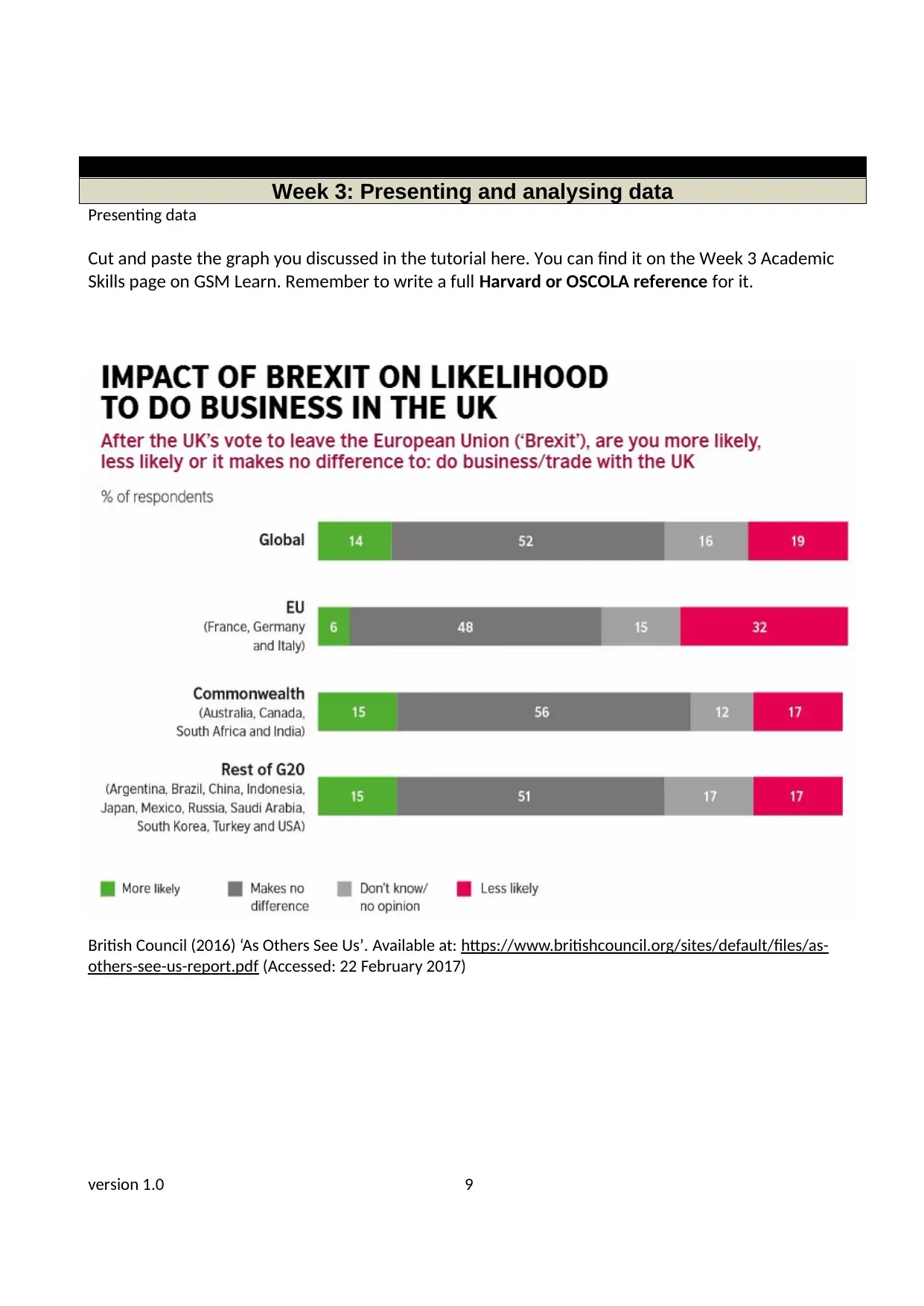
SECTION 1: PORTFOLIO EVIDENCE
Week 3: Presenting and analysing data
Presenting data
Cut and paste the graph you discussed in the tutorial here. You can find it on the Week 3 Academic
Skills page on GSM Learn. Remember to write a full Harvard or OSCOLA reference for it.
British Council (2016) ‘As Others See Us’. Available at: https://www.britishcouncil.org/sites/default/files/as-
others-see-us-report.pdf (Accessed: 22 February 2017)
version 1.0 9
Week 3: Presenting and analysing data
Presenting data
Cut and paste the graph you discussed in the tutorial here. You can find it on the Week 3 Academic
Skills page on GSM Learn. Remember to write a full Harvard or OSCOLA reference for it.
British Council (2016) ‘As Others See Us’. Available at: https://www.britishcouncil.org/sites/default/files/as-
others-see-us-report.pdf (Accessed: 22 February 2017)
version 1.0 9
⊘ This is a preview!⊘
Do you want full access?
Subscribe today to unlock all pages.

Trusted by 1+ million students worldwide
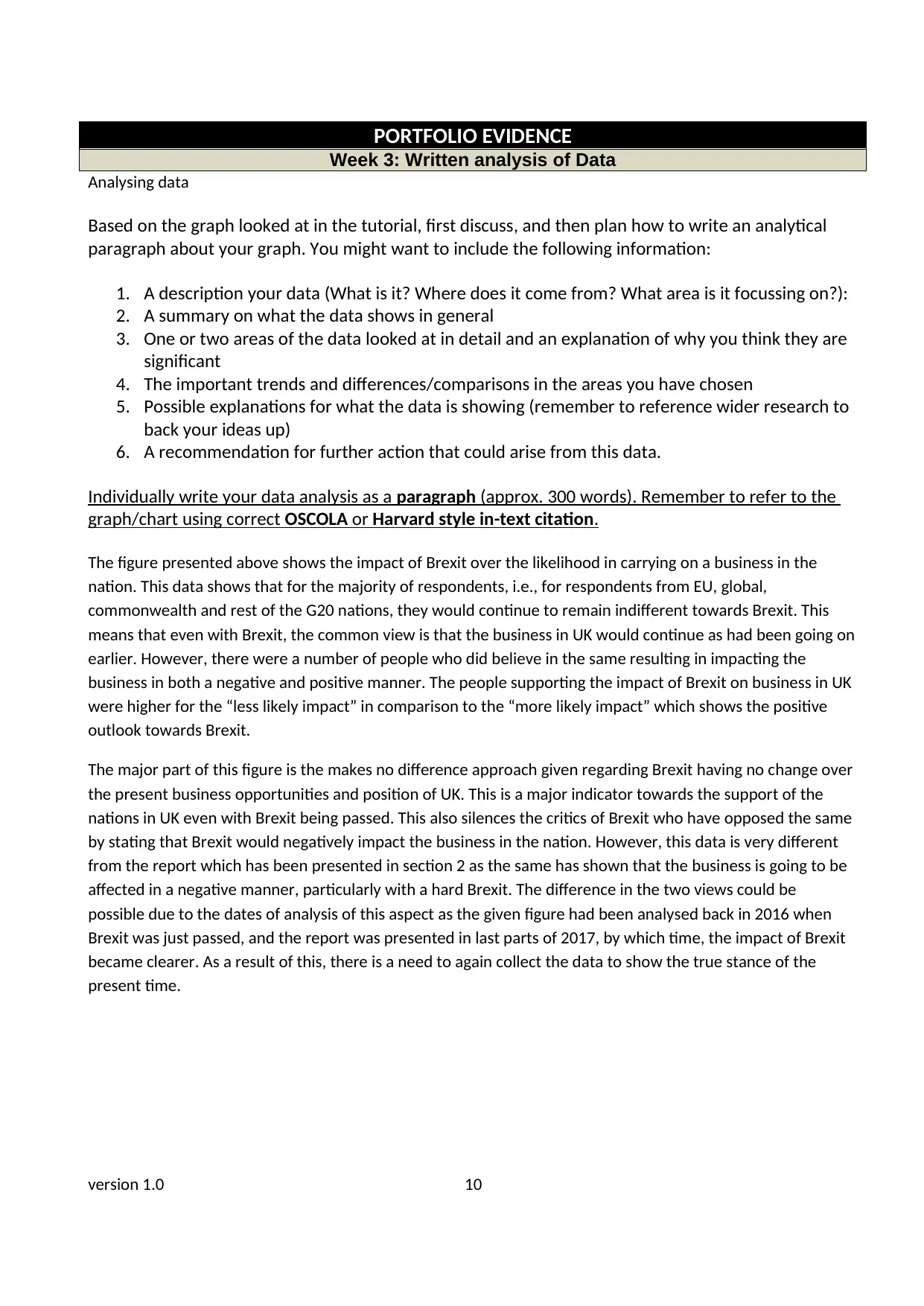
PORTFOLIO EVIDENCE
Week 3: Written analysis of Data
Analysing data
Based on the graph looked at in the tutorial, first discuss, and then plan how to write an analytical
paragraph about your graph. You might want to include the following information:
1. A description your data (What is it? Where does it come from? What area is it focussing on?):
2. A summary on what the data shows in general
3. One or two areas of the data looked at in detail and an explanation of why you think they are
significant
4. The important trends and differences/comparisons in the areas you have chosen
5. Possible explanations for what the data is showing (remember to reference wider research to
back your ideas up)
6. A recommendation for further action that could arise from this data.
Individually write your data analysis as a paragraph (approx. 300 words). Remember to refer to the
graph/chart using correct OSCOLA or Harvard style in-text citation.
The figure presented above shows the impact of Brexit over the likelihood in carrying on a business in the
nation. This data shows that for the majority of respondents, i.e., for respondents from EU, global,
commonwealth and rest of the G20 nations, they would continue to remain indifferent towards Brexit. This
means that even with Brexit, the common view is that the business in UK would continue as had been going on
earlier. However, there were a number of people who did believe in the same resulting in impacting the
business in both a negative and positive manner. The people supporting the impact of Brexit on business in UK
were higher for the “less likely impact” in comparison to the “more likely impact” which shows the positive
outlook towards Brexit.
The major part of this figure is the makes no difference approach given regarding Brexit having no change over
the present business opportunities and position of UK. This is a major indicator towards the support of the
nations in UK even with Brexit being passed. This also silences the critics of Brexit who have opposed the same
by stating that Brexit would negatively impact the business in the nation. However, this data is very different
from the report which has been presented in section 2 as the same has shown that the business is going to be
affected in a negative manner, particularly with a hard Brexit. The difference in the two views could be
possible due to the dates of analysis of this aspect as the given figure had been analysed back in 2016 when
Brexit was just passed, and the report was presented in last parts of 2017, by which time, the impact of Brexit
became clearer. As a result of this, there is a need to again collect the data to show the true stance of the
present time.
version 1.0 10
Week 3: Written analysis of Data
Analysing data
Based on the graph looked at in the tutorial, first discuss, and then plan how to write an analytical
paragraph about your graph. You might want to include the following information:
1. A description your data (What is it? Where does it come from? What area is it focussing on?):
2. A summary on what the data shows in general
3. One or two areas of the data looked at in detail and an explanation of why you think they are
significant
4. The important trends and differences/comparisons in the areas you have chosen
5. Possible explanations for what the data is showing (remember to reference wider research to
back your ideas up)
6. A recommendation for further action that could arise from this data.
Individually write your data analysis as a paragraph (approx. 300 words). Remember to refer to the
graph/chart using correct OSCOLA or Harvard style in-text citation.
The figure presented above shows the impact of Brexit over the likelihood in carrying on a business in the
nation. This data shows that for the majority of respondents, i.e., for respondents from EU, global,
commonwealth and rest of the G20 nations, they would continue to remain indifferent towards Brexit. This
means that even with Brexit, the common view is that the business in UK would continue as had been going on
earlier. However, there were a number of people who did believe in the same resulting in impacting the
business in both a negative and positive manner. The people supporting the impact of Brexit on business in UK
were higher for the “less likely impact” in comparison to the “more likely impact” which shows the positive
outlook towards Brexit.
The major part of this figure is the makes no difference approach given regarding Brexit having no change over
the present business opportunities and position of UK. This is a major indicator towards the support of the
nations in UK even with Brexit being passed. This also silences the critics of Brexit who have opposed the same
by stating that Brexit would negatively impact the business in the nation. However, this data is very different
from the report which has been presented in section 2 as the same has shown that the business is going to be
affected in a negative manner, particularly with a hard Brexit. The difference in the two views could be
possible due to the dates of analysis of this aspect as the given figure had been analysed back in 2016 when
Brexit was just passed, and the report was presented in last parts of 2017, by which time, the impact of Brexit
became clearer. As a result of this, there is a need to again collect the data to show the true stance of the
present time.
version 1.0 10
Paraphrase This Document
Need a fresh take? Get an instant paraphrase of this document with our AI Paraphraser
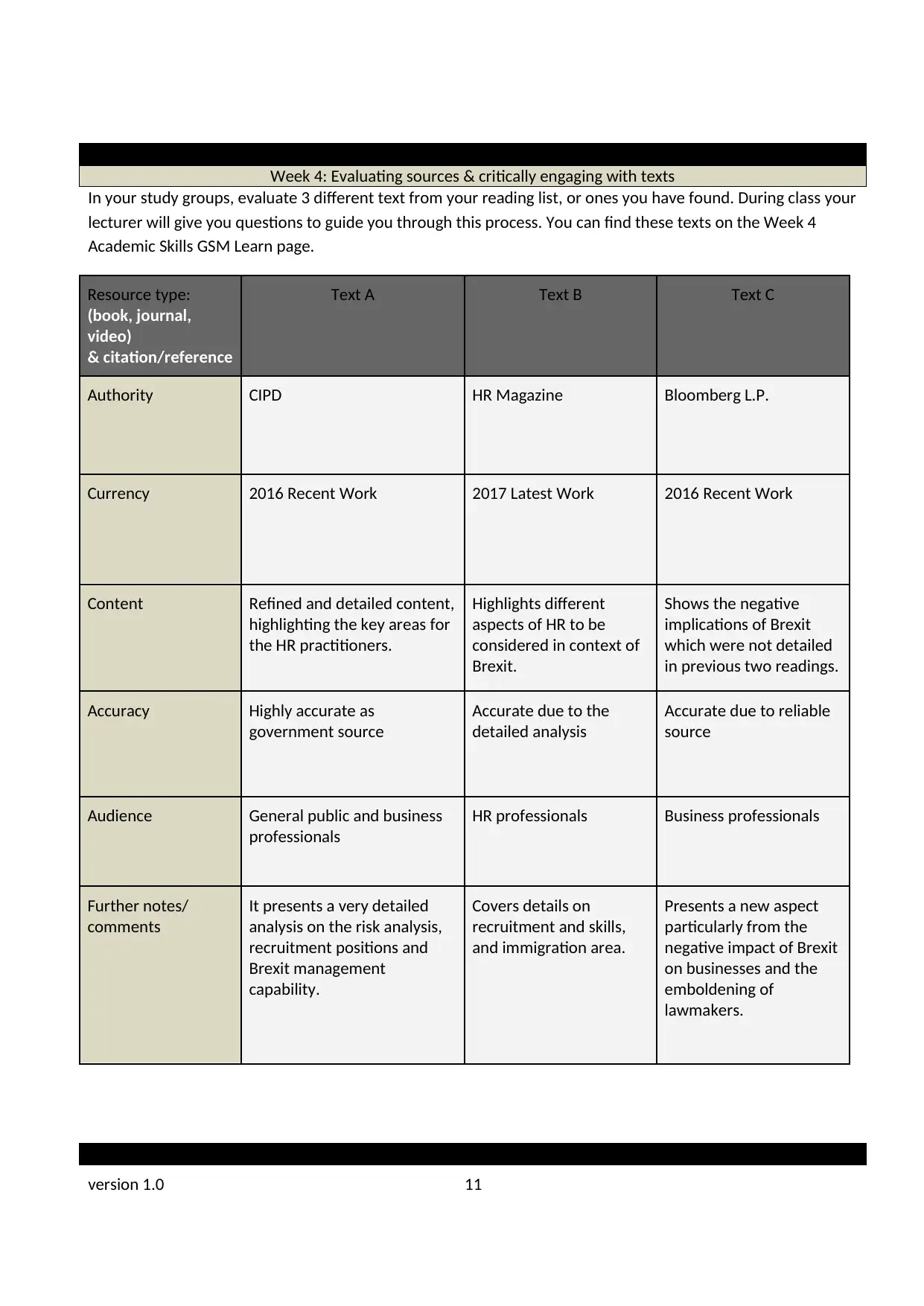
PORTFOLIO EVIDENCE
Week 4: Evaluating sources & critically engaging with texts
In your study groups, evaluate 3 different text from your reading list, or ones you have found. During class your
lecturer will give you questions to guide you through this process. You can find these texts on the Week 4
Academic Skills GSM Learn page.
Resource type:
(book, journal,
video)
& citation/reference
Text A Text B Text C
Authority CIPD HR Magazine Bloomberg L.P.
Currency 2016 Recent Work 2017 Latest Work 2016 Recent Work
Content Refined and detailed content,
highlighting the key areas for
the HR practitioners.
Highlights different
aspects of HR to be
considered in context of
Brexit.
Shows the negative
implications of Brexit
which were not detailed
in previous two readings.
Accuracy Highly accurate as
government source
Accurate due to the
detailed analysis
Accurate due to reliable
source
Audience General public and business
professionals
HR professionals Business professionals
Further notes/
comments
It presents a very detailed
analysis on the risk analysis,
recruitment positions and
Brexit management
capability.
Covers details on
recruitment and skills,
and immigration area.
Presents a new aspect
particularly from the
negative impact of Brexit
on businesses and the
emboldening of
lawmakers.
PORTFOLIO EVIDENCE
version 1.0 11
Week 4: Evaluating sources & critically engaging with texts
In your study groups, evaluate 3 different text from your reading list, or ones you have found. During class your
lecturer will give you questions to guide you through this process. You can find these texts on the Week 4
Academic Skills GSM Learn page.
Resource type:
(book, journal,
video)
& citation/reference
Text A Text B Text C
Authority CIPD HR Magazine Bloomberg L.P.
Currency 2016 Recent Work 2017 Latest Work 2016 Recent Work
Content Refined and detailed content,
highlighting the key areas for
the HR practitioners.
Highlights different
aspects of HR to be
considered in context of
Brexit.
Shows the negative
implications of Brexit
which were not detailed
in previous two readings.
Accuracy Highly accurate as
government source
Accurate due to the
detailed analysis
Accurate due to reliable
source
Audience General public and business
professionals
HR professionals Business professionals
Further notes/
comments
It presents a very detailed
analysis on the risk analysis,
recruitment positions and
Brexit management
capability.
Covers details on
recruitment and skills,
and immigration area.
Presents a new aspect
particularly from the
negative impact of Brexit
on businesses and the
emboldening of
lawmakers.
PORTFOLIO EVIDENCE
version 1.0 11
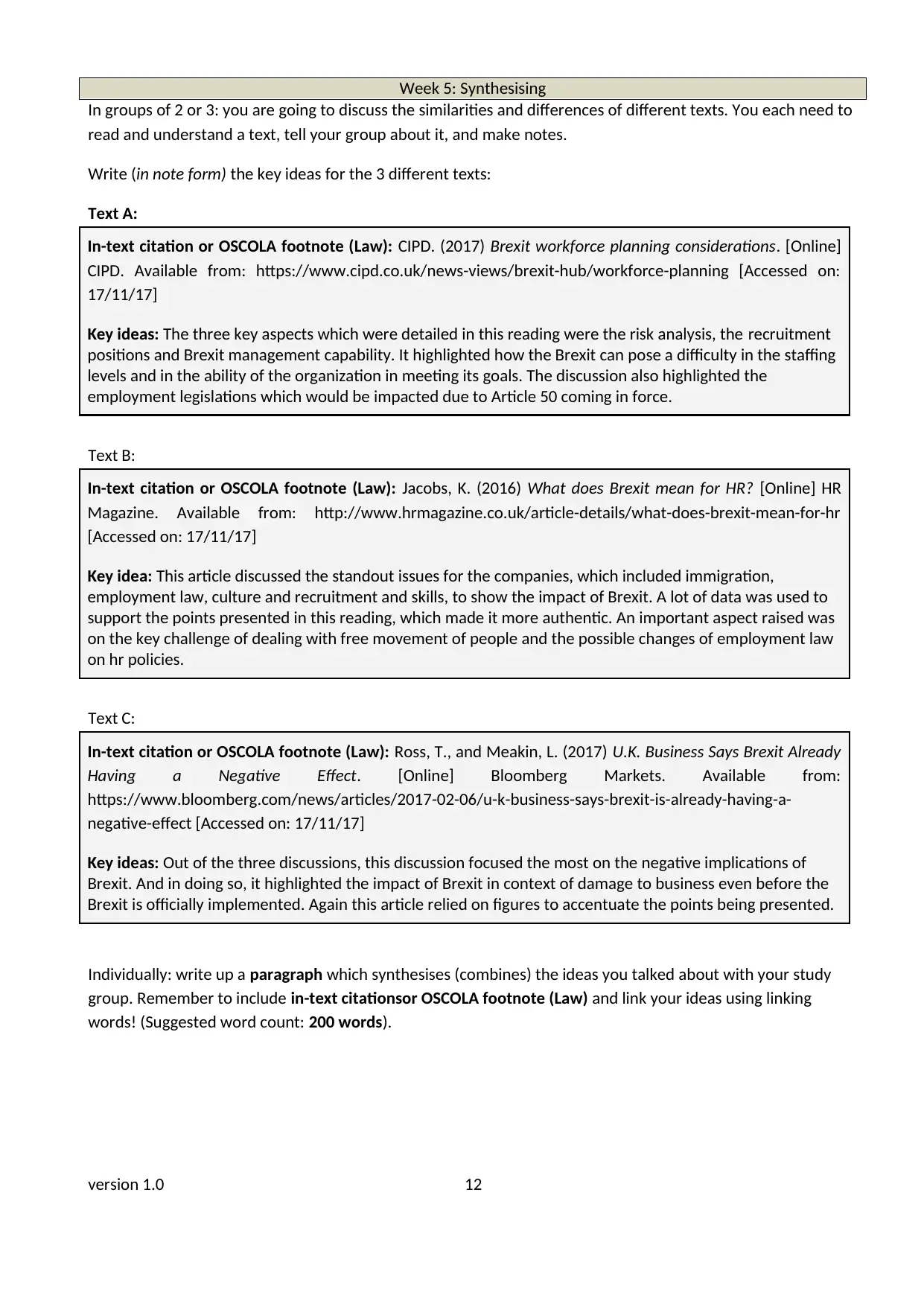
Week 5: Synthesising
In groups of 2 or 3: you are going to discuss the similarities and differences of different texts. You each need to
read and understand a text, tell your group about it, and make notes.
Write (in note form) the key ideas for the 3 different texts:
Text A:
In-text citation or OSCOLA footnote (Law): CIPD. (2017) Brexit workforce planning considerations. [Online]
CIPD. Available from: https://www.cipd.co.uk/news-views/brexit-hub/workforce-planning [Accessed on:
17/11/17]
Key ideas: The three key aspects which were detailed in this reading were the risk analysis, the recruitment
positions and Brexit management capability. It highlighted how the Brexit can pose a difficulty in the staffing
levels and in the ability of the organization in meeting its goals. The discussion also highlighted the
employment legislations which would be impacted due to Article 50 coming in force.
Text B:
In-text citation or OSCOLA footnote (Law): Jacobs, K. (2016) What does Brexit mean for HR? [Online] HR
Magazine. Available from: http://www.hrmagazine.co.uk/article-details/what-does-brexit-mean-for-hr
[Accessed on: 17/11/17]
Key idea: This article discussed the standout issues for the companies, which included immigration,
employment law, culture and recruitment and skills, to show the impact of Brexit. A lot of data was used to
support the points presented in this reading, which made it more authentic. An important aspect raised was
on the key challenge of dealing with free movement of people and the possible changes of employment law
on hr policies.
Text C:
In-text citation or OSCOLA footnote (Law): Ross, T., and Meakin, L. (2017) U.K. Business Says Brexit Already
Having a Negative Effect. [Online] Bloomberg Markets. Available from:
https://www.bloomberg.com/news/articles/2017-02-06/u-k-business-says-brexit-is-already-having-a-
negative-effect [Accessed on: 17/11/17]
Key ideas: Out of the three discussions, this discussion focused the most on the negative implications of
Brexit. And in doing so, it highlighted the impact of Brexit in context of damage to business even before the
Brexit is officially implemented. Again this article relied on figures to accentuate the points being presented.
Individually: write up a paragraph which synthesises (combines) the ideas you talked about with your study
group. Remember to include in-text citationsor OSCOLA footnote (Law) and link your ideas using linking
words! (Suggested word count: 200 words).
version 1.0 12
In groups of 2 or 3: you are going to discuss the similarities and differences of different texts. You each need to
read and understand a text, tell your group about it, and make notes.
Write (in note form) the key ideas for the 3 different texts:
Text A:
In-text citation or OSCOLA footnote (Law): CIPD. (2017) Brexit workforce planning considerations. [Online]
CIPD. Available from: https://www.cipd.co.uk/news-views/brexit-hub/workforce-planning [Accessed on:
17/11/17]
Key ideas: The three key aspects which were detailed in this reading were the risk analysis, the recruitment
positions and Brexit management capability. It highlighted how the Brexit can pose a difficulty in the staffing
levels and in the ability of the organization in meeting its goals. The discussion also highlighted the
employment legislations which would be impacted due to Article 50 coming in force.
Text B:
In-text citation or OSCOLA footnote (Law): Jacobs, K. (2016) What does Brexit mean for HR? [Online] HR
Magazine. Available from: http://www.hrmagazine.co.uk/article-details/what-does-brexit-mean-for-hr
[Accessed on: 17/11/17]
Key idea: This article discussed the standout issues for the companies, which included immigration,
employment law, culture and recruitment and skills, to show the impact of Brexit. A lot of data was used to
support the points presented in this reading, which made it more authentic. An important aspect raised was
on the key challenge of dealing with free movement of people and the possible changes of employment law
on hr policies.
Text C:
In-text citation or OSCOLA footnote (Law): Ross, T., and Meakin, L. (2017) U.K. Business Says Brexit Already
Having a Negative Effect. [Online] Bloomberg Markets. Available from:
https://www.bloomberg.com/news/articles/2017-02-06/u-k-business-says-brexit-is-already-having-a-
negative-effect [Accessed on: 17/11/17]
Key ideas: Out of the three discussions, this discussion focused the most on the negative implications of
Brexit. And in doing so, it highlighted the impact of Brexit in context of damage to business even before the
Brexit is officially implemented. Again this article relied on figures to accentuate the points being presented.
Individually: write up a paragraph which synthesises (combines) the ideas you talked about with your study
group. Remember to include in-text citationsor OSCOLA footnote (Law) and link your ideas using linking
words! (Suggested word count: 200 words).
version 1.0 12
⊘ This is a preview!⊘
Do you want full access?
Subscribe today to unlock all pages.

Trusted by 1+ million students worldwide
1 out of 38
Related Documents
Your All-in-One AI-Powered Toolkit for Academic Success.
+13062052269
info@desklib.com
Available 24*7 on WhatsApp / Email
![[object Object]](/_next/static/media/star-bottom.7253800d.svg)
Unlock your academic potential
Copyright © 2020–2026 A2Z Services. All Rights Reserved. Developed and managed by ZUCOL.




